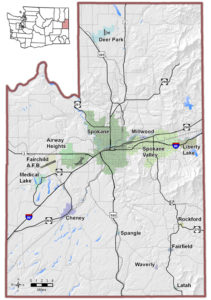About Spokane Regional Transportation Council
 The Spokane Regional Transportation Council (SRTC) is the lead agency for transportation planning services for the area covered by Spokane County. The agency has several roles; at the federal level, SRTC is designated a Metropolitan Planning Organization (MPO), while it is designated a Regional Transportation Planning Organization (RTPO) by state law.
The Spokane Regional Transportation Council (SRTC) is the lead agency for transportation planning services for the area covered by Spokane County. The agency has several roles; at the federal level, SRTC is designated a Metropolitan Planning Organization (MPO), while it is designated a Regional Transportation Planning Organization (RTPO) by state law.
MPOs and RTPOs serve the same basic planning functions. Federal law requires any urbanized area with a population greater than 50,000 to have an MPO to ensure that transportation expenditures are based on a continuing, cooperative and comprehensive planning process.
Federal funds for transportation projects and programs are channeled through this planning process and awarded to local agencies and jurisdictions dealing with transportation in Spokane County.
State funds also go through this process to be awarded to local agencies and jurisdictions in Spokane County. SRTC receives both federal and state funding to support planning efforts. SRTC staff is directed by a board of elected and appointed officials. Staff collects transportation data, projects the need for infrastructure, and prioritizes projects based on available funding.
As either an MPO and/or RTPO, SRTC does not have authority to directly tax or implement user fees. SRTC receives budget appropriations from federal and state government and collects dues from member jurisdictions.
Urbanized areas over 200,000 in population are designated by federal legislation as Transportation Management Areas (TMA’s). SRTC is the federally designated TMA for the Spokane Metropolitan Planning Area. TMA’s have additional responsibilities and discretion in allocating certain federal transportation funds within the urbanized area. Those responsibilities require public transportation representation on the SRTC Board, a regionally coordinated Congestion Management Process, and authority for Transportation Improvement Program (TIP) project selection. and the Federal Transit Administration (FTA) and the Federal Highway Administration (FHWA) must jointly certify the TMA every four years.
Federal Certification
Federal & State Legislation
More Information about SRTC
SRTC Services and Member Jurisdictions
Services SRTC offers include conducting transportation studies, census information analysis, air quality conformity and analysis, traffic count data, geographic information services such as mapmaking and demographic analysis, and travel demand modeling.
SRTC encourages coordination and collaboration between planning and transportation departments at member agencies, including the City of Spokane, Spokane Valley, Spokane County, the Washington State Department of Transportation, Spokane Transit,the Washington State Transportation Commission, as well as all cities and towns within Spokane County.
An Interlocal Agreement between these agencies shows our commitment to working together to provide each other, and the public, with quality transportation services.
Spokane Regional Transportation Management Center
SRTC also partners with the Spokane Regional Transportation Management Center (SRTMC) to relay traffic information to the public. The SRTMC is a center that is staffed at all times to evaluate and react to events that impact travel and roadway safety. By notifying responders and posting information to the internet, 511, and email/text alerts, SRTMC operators help to reduce congestion and collisions.
With more than 100 live streaming traffic camera feeds available to view at www.srtmc.org, 23 electronic variable message signs, 10 highway advisory radio AM transmitters, various intelligent transportation system devices such as volume/speed detectors, and hundreds of traffic signals, the SRTMC is the hub of the region’s transportation management system.
SRTC’s Mission, Vision & Values
Our Mission:
Develop plans and programs that coordinate transportation planning in the Spokane region.
Our Vision:
The Spokane region possesses the best multi-modal/multi-jurisdictional transportation network that optimizes safety, capacity, and efficiency in the movement of people and goods for a region of our size.
Our Values: Regional Leadership, Collaboration, Accountability, Innovation, Transparency, Inclusiveness, Integrity
